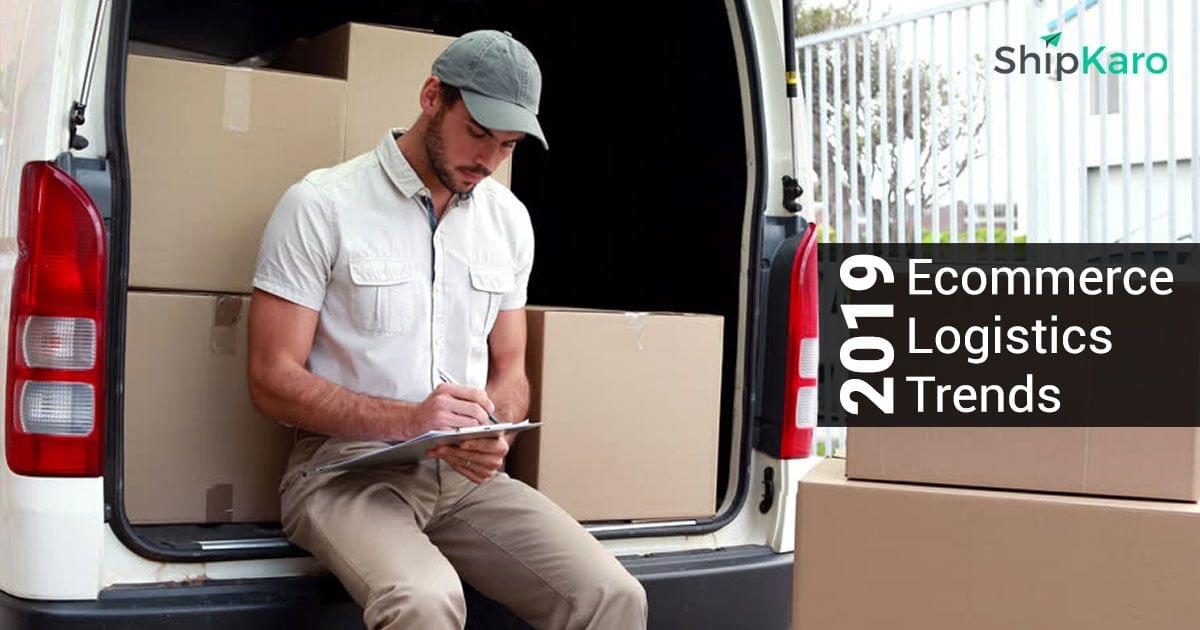Who wouldn’t want to enhance their operational efficiency, increase utilization of on-field resources, serve more customers and above all improve customer satisfaction? Efficient logistics management is the key factor and the core differentiator in determining the success of these parameters. However, managing a smooth shipping service for your business is easier said than done. Increasing customer expectations with faster delivery options and cheaper price rates are only adding to the complexities of this supply chain process.
In order to help e-commerce retailers to craft a seamless shipping process, shipping companies have now embraced technological innovations. These new-age services enable e-commerce retailers and e-commerce courier services to fulfil customer demands and improve efficiency.
As transportation and shipping charges take a large portion of every e-commerce business expenses, e-retailers are constantly trying to manage these complex operations through technology tools. Thus, a company can now majorly improve their efficiency with an automated and cost-effective shipping system. There are several shipping companies that are now offering automated shipping solutions that improve scalability, reduces manual errors, and provides a proactive approach to customer satisfaction.
Along with increasing efficiency and improving customer service, new technological innovations in the logistics industry are now aiming at increased sales and improved relationships. With the governments recognising the growth of e-commerce and facilitating their shipping operations, e-retailers have much to hope for in the future. Here are 5 major trends in e-commerce shipping that will redefine shipping for e-commerce in 2019:
- Ease of shipping across states with less paperwork: With the implementation of GST in India, the unified tax rates has eliminated the need for multiple state taxes for logistics which previously existed. The electronic bill system introduced under GST in April 2018 ensures greater tax transparency and a hassle-free movement of goods from one state to another. This way, e-commerce courier services need not have separate transit passes for moving goods across state borders as the electronic bill is valid throughout India. This means that the vehicles carrying goods need not wait for a long time at state borders to get clearance with regard to state taxes. Consequently, shipping across states in India has now become easier and faster with very less paperwork and formalities.
- Automated shipping eliminating manual work and making processes faster: Automation of shipping processes will use data-driven software or platform that will improve the operational efficiency of logistics by offering a variety of solutions – from package labelling to streamlining purchase orders. This will not only save a considerable amount of time but also eliminate errors through manual interference. Moreover, future trends show an increase in the popularity of automated shipping platforms that offer robust reporting capabilities. This will, in turn, help e-commerce retailers to track previous data to plan for future shipments and proactively overcome hurdles. By allowing complex operational tasks to be handled by technology instead of human personnel, e-retailers can now shift the said human resource to other tasks that add more value to the organization – tasks that cannot be handled by a machine.
- Shipping aggregator platforms that offer multiple options: A shipping aggregator is already a familiar name among major e-retailers. However, 2019 looks like the year where shipping aggregators will take over e-commerce shipping among small and big players equally. This is primarily because a shipping aggregator platform can streamline the shipping process by increasing transparency and simplifying processes. This will allow the comparison of multiple e-commerce courier services for individual products and will help e-marketers in finding the most cost-effective and convenient option for shipping.
The vast carrier network can also provide the ability to overcome shipping hurdles and price negotiations by taking advantage of multiple courier options. By relying on shipping aggregators for shipping, e-retailers can reduce the overall shipping costs and save both time and money. With advanced technology benefits like real-time tracking, it will be possible to constantly keep an eye on the shipments at every stage and keep the customers informed.
Pretty soon with a reliable third-party shipping aggregator, e-commerce players can totally change the way they have been handling shipping to a more efficient and simpler way. They can be well assured that they have given their business to expert professionals and there is also no need to train and maintain a separate team for handling logistics.
- Shipping on the go with mobile: With mobile phones handling almost every aspect of new age businesses, how can shipping be far behind. Major shipping companies are offering the option to manage the shipping process and requirements through mobile phones. Reputed shipping platforms now already allow to make shipments from the admin panels on mobile devices and thus help to keep track of the shipments. With the trend seemingly catching on, irrespective of the location and the device, it will be possible to handle shipping on the go. This way e-retailers will be able to improve end-to-end visibility of their e-commerce courier services and shipping operations from everywhere.
- Automated Shipments syncing for selling on a variety of platforms: Selling on a variety of platforms is the new normal for e-commerce. However, ask anyone who has done this, managing the shipments for various channels and keeping a centralized record is the biggest challenge in this environment. Shipping solutions that make this task easier and seamless are going to rule in 2019 and beyond.
Irrespective of where the products are being sold, be it marketplaces, own website etc., e-commerce retailers will be able to centralize the management of the logistics on a single platform with the option of automated order syncing. This will ensure the streamlining of processes across multiple shipping and receiving locations. Moreover, it will provide e-retailers with additional visibility to help improve the coordination between customer orders and courier services.
The major trends point to a technology-driven logistics industry which will help streamline the entire process and simplify the complexity of the operations. That is why it is imperative to ensure that the selection of the technology for your shipping requirements must be driven by the platform/ tool’s potential to automate processes, reduce errors, take action on exceptions through alerts and reduce complexity with better workflows.
If you wish to take full advantage of the opportunities provided by these trends, invest in the latest technology that has adapted innovative approach for shipping. With digital tools that drive progress, ShipKaro’s shipping aggregator platform gives you a competitive edge in the market.
We hope we have covered all the latest trends that are expected to change the e-commerce logistics industry this year. Did we miss something on the latest e-commerce logistics buzz? Let’s discuss that in the comments section below. Also, if you wish to know further about ShipKaro, feel free to reach out to us.




Leave a Comment